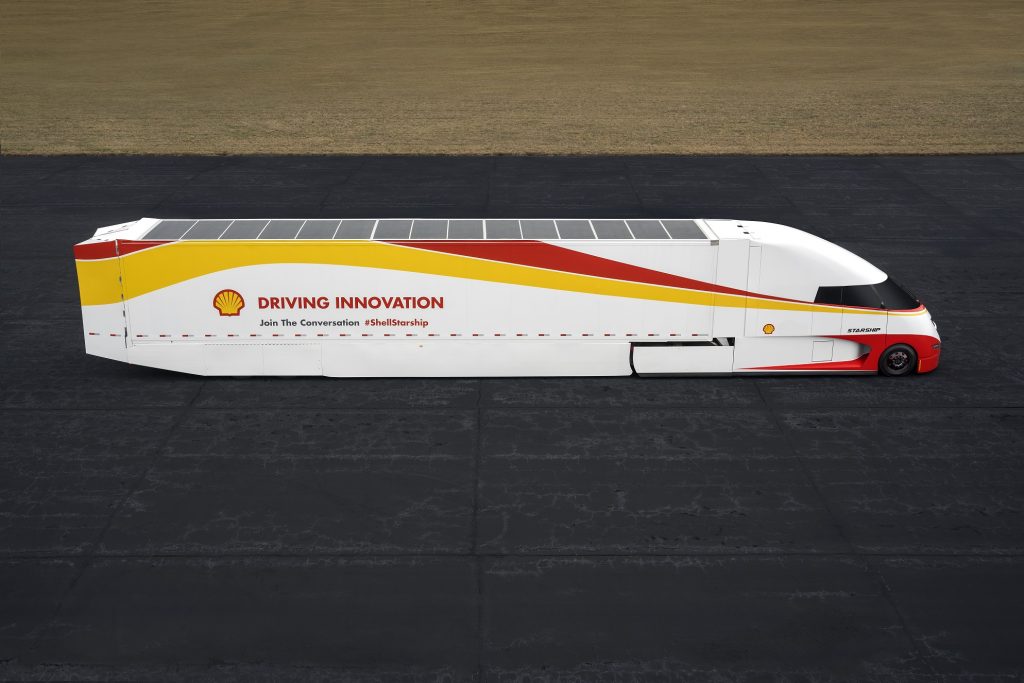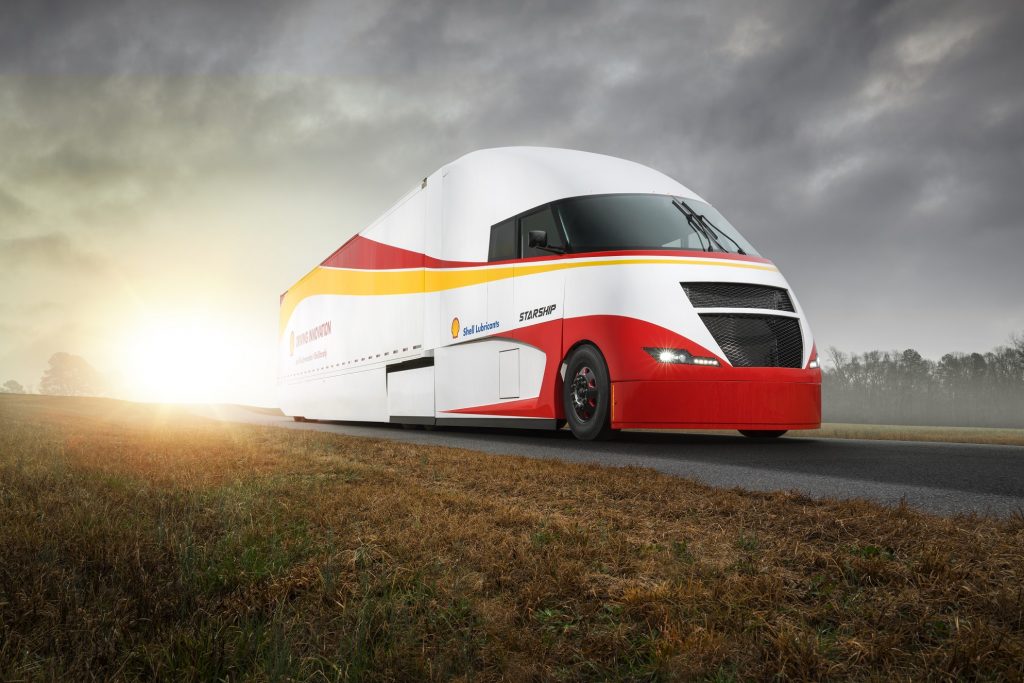Shell Lubricants and AirFlow Truck Company have unveiled a new hyper fuel-efficient truck. This next-generation vehicle, named Starship, was designed and built by the companies with the aim of demonstrating what is possible in reducing energy demand in freight transportation. It uses currently available technologies to minimise the amount of energy it takes to transport a load of cargo from one point to another. The truck is currently on public display at the Shell Make the Future California event at the Sonoma Raceway.

“We seek projects such as the Starship initiative to keep Shell at the leading edge of technology development and energy efficiency. Working with AirFlow Truck Company and other suppliers gives Shell Lubricants the opportunity to align with innovative companies to explore what is really possible in fuel efficiency” says Robert Mainwaring, Technology Manager for Innovation, Shell Lubricants. “Transport accounts for more than one quarter of the world’s total energy use and one-fifth of global energy-related carbon dioxide emissions: 72 % of which is attributable to road transportation of which trucks make up a significant part. Increasing efficiency and fuel economy in the commercial transport sector could therefore make considerable progress to help reduce emissions.”
With new fuel economy regulations on the horizon across the globe and the need for continuing advances in fuel economy, Shell Lubricants recognises that a holistic approach to making advances is important. However, obtaining significant fuel economy improvements in heavy duty trucks is a challenging process given the size and construction of a tractor and trailer and it is an area which has not had much focus in recent decades.
“Shell firmly believes that collaborative, co-engineering, relationships are essential to the effective reduction in emissions and enhancements in efficiency and have developed such co-engineering relationships with several world leading OEMs,” said Mainwaring. “The relationship with the AirFlow Truck Company and other suppliers to build the Starship Project is part of a collaborative process led by Shell that encourages co-engineering, and has resulted in a truck that will be used to challenge how trucking efficiency is defined. In recent years, we developed a concept car which explored the role that light weighting, streamlining and lubrication played in personal transport. Starship is the Shell Concept Car’s equivalent for freight transport.”
Shell provided technical consultation on engine and drivetrain components, as well as recommendations for lubricant needs for use in the Starship Project truck. The truck is using Shell’s next generation, low viscosity, fully synthetic heavy duty engine oil. The use of fully synthetic base oils, plus advanced additive technology provides protection against wear, deposits and oil breakdown. The lower viscosity delivers superior fuel economy compared to a conventional SAE 15W-40. The lubrication technology shares the same viscosity as Shell Rimula Ultra E+ and is being tested by OEMs around the world.

“As the leader in heavy duty lubricants we have a responsibility to the industry beyond simply our products. That’s why I’m so proud of this collaboration with AirFlow Trucking – which provides a unique opportunity to explore ways to improve fuel economy in transport application. Moving forward, we need creative solutions to the world’s energy challenge such as Starship that will benefit our customers, drivers and the wider world for years to come” says Chris Guerrero, Global Brand Manager, Heavy Duty Lubricants
Ahead of its first public display at the Shell Make the Future event in Sonoma, the companies have continued to fine tune the truck. In May 2018, Shell and AirFlow Truck Company will demonstrate the performance of the Starship on a US coast-to-coast drive: beginning in California and ending in Florida. The truck will carry the maximum viable amount of freight within the allowed gross vehicle weight of 80,000lbs/36,287kgs.
The freight tonne efficiency and fuel economy will be measured along the way and the result will be shared publicly. Freight tonne efficiency is the primary indicator that will be measured on the Starship truck. Shell and Airflow believe this is the most meaningful measurement of efficiency of freight transportation. It is defined as the energy required to move freight from point A to point B. Maximising the amount of load the truck is carrying will decrease the fuel economy, however it will improve freight tonne efficiency and reduce weight specific carbon emissions.
The lessons learned from the Starship Project are globally relevant. The trucking sector worldwide is united in the challenge to “go further with less”; to reduce fuel consumption while maximising load; both in pursuit of lower costs and to meet fuel economy regulations. The truck operates with modern Class 8 engine technology, the demands of which are replicated worldwide; higher temperatures, mechanical and corrosive wear, minimising deposit build-up and the need for extended oil-drain intervals and engine life. A large selection of innovative technologies to aid (fuel) efficiency are commercially available in many markets around the world, we have used a range of these in Starship. These are therefore solutions that truck owners around the globe can readily implement to realise benefits in their own vehicles. The Starship project is one step in the journey to target the world’s global energy challenge; a journey that will benefit the trucking sector directly and the wider environment.

No Responses